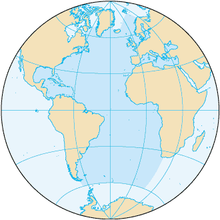
Atlantic history is a specialty field in history that studies the Atlantic World in the early modern period. The Atlantic World was created by the contact between Europeans and the Americas, and Atlantic History is the study of that world.[1] It is premised on the idea that, following the rise of sustained European contact with the New World in the 16th century, the continents that bordered the Atlantic Ocean—the Americas, Europe, and Africa—constituted a regional system or common sphere of economic and cultural exchange that can be studied as a totality.[2]
Its theme is the complex interaction between Europe (especially Great Britain, France, Spain, and Portugal) and their colonies in the Americas. It encompasses a wide range of demographic, social, economic, political, legal, military, intellectual and religious topics treated in comparative fashion by looking at both sides of the Atlantic. Religious revivals in Britain and Germany are studies, as well as the First Great Awakening in the Thirteen Colonies. Emigration, race and slavery are also important topics.[3]
Researchers of Atlantic history typically focus on the interconnections and exchanges between these regions and the civilizations they harbored. In particular, they argue that the boundaries between nation states which traditionally determined the limits of older historiography should not be applied to such transnational phenomena as slavery, colonialism, missionary activity and economic expansion. Environmental history and the study of historical demography also play an important role, as many key questions in the field revolve around the ecological and epidemiological impact of the Columbian exchange.
Robert R. Palmer, an American historian of the French Revolution, pioneered the concept in the 1950s with a wide-ranging comparative history of how numerous nations experienced what he called The Age of the Democratic Revolution: A Political History of Europe and America, 1760–1800 (1959 and 1964).[4] In this monumental work, he did not compare the French and the American Revolutions as successful models against other types of revolutions. Indeed, he developed a wider understanding of the changes that were led by revolutionary processes across the Western civilization. Such work followed in the footsteps of C. L. R. James who, in the 1930s, connected the French and Haitian Revolutions. Since the 1980s Atlantic history has emerged as an increasingly popular alternative to the older discipline of imperial history, although it could be argued that the field is simply a refinement and reorientation of traditional historiography dealing with the interaction between early modern Europeans and native peoples in the Atlantic sphere. The organization of Atlantic History as a recognized area of historiography began in the 1980s under the impetus of American historians Bernard Bailyn of Harvard University and Jack P. Greene of Johns Hopkins University, among others. The post-World War II integration of the European Union and the continuing importance of NATO played an indirect role in stimulating interest throughout the 1990s.[3]
- ^ Bailyn, Bernard. 2005. Atlantic History : Concept and Contours. Cambridge, Mass: Harvard University Press, 2005
- ^ Karen Ordahl Kupperman, The Atlantic in World History (2012)
- ^ a b O'Reilly, (2004)
- ^ Edoardo Tortarolo, "Eighteenth-century Atlantic history old and new," History of European Ideas (2008) 34#4, pp. 369–374.